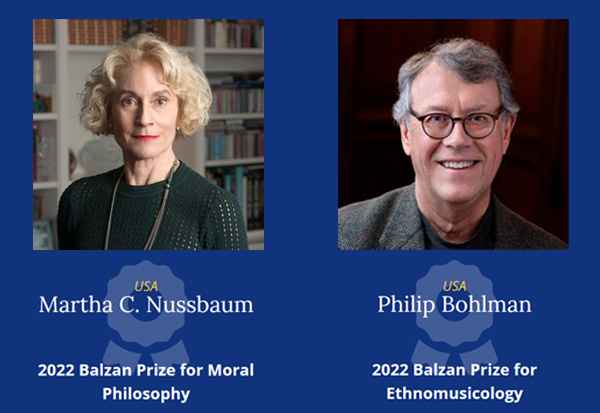Two UChicago Humanities Scholars Receive the International Balzan Prizes

By Sara Patterson
UChicago Prof. Philip V. Bohlman and UChicago Prof. Martha C. Nussbaum were awarded the International Balzan Prizes for their seminal and sustained contributions respectively to ethnomusicology and music research and wide-ranging philosophical topics.
The annual Balzan Prizes honor “scholars and scientists who have distinguished themselves in their fields on an international level.” Bohlman has received the first Balzan Prize in ethnomusicology—a relatively new field—and only one of five awards in music scholarship ever granted. Of the four Balzan Prizes awarded in 2022, UChicago faculty received an unusually high 50 percent share.
“I have sought to reveal the ways musicology can allow a scholarly world to deal with critical ideas and look at crucial problems in the world of migration,” said Bohlman, the Ludwig Rosenberger Distinguished Service Professor in the Department of Music. “We are not limited to specialties; big ideas drive us forward as activist scholars.”
For ethnomusicology, Bohlman uses a multidisciplinary approach in which ethnography, historical research, and music performance intersect. According to the Balzan Prize committee members, his work on music, race, and the colonial encounter, globalization, the interstices between music and religion, Jewish music in modernity, and the historically informed performance of Jewish urban music were crucial to why he was selected.
“Philip employs multiple lenses in his numerous, outstanding writings on ethnomusicology: cultural and national, political and aesthetic, ethnic and racial, sacred and secular,” said Anne Walters Robertson, Dean of the Division of the Humanities and the Claire Dux Swift Distinguished Service Professor in the Department of Music. “His focus on sites of in-betweenness, particularly those formed out of displacement and disjuncture, has shown us how music helps generate forms of human identity.”
Born in Boscobel, Wis., Bohlman grew up far from cosmopolitan settings but close to the border of Wisconsin and Illinois, instilling him with a lifelong fascination with borderlands. Originally, Bohlman was the town musician, playing the piano, and aspiring to be a geneticist. Instead, he switched career directions in his graduate studies when under the direction of pioneer ethnomusicologist Bruno Nettl. Bohlman was the first ethnomusicologist at the University of Chicago.
“My work in ethnomusicology is international and spans many languages,” Bohlman said. “I have written books in German as well as in English. I’m involved in projects in India through UChicago’s Delhi Center and a jazz webinar in China through UChicago’s Hong Kong Center, not to mention scholarship and research in Germany and Israel. Ethnomusicology is world music often in places where human societies are in danger such as borders for migrants.”
Of the 750,000 Swiss francs awarded to each recipient, Bohlman plans to use half of it to set up workshops and research projects for young and senior scholars on critical research in ethnomusicology for encounters at borders. “While the focus will be ethnomusicology at borders, world music is in the places where human societies are in danger from immigration and the precariousness of cultures,” Bohlman said.
A distinguished public intellectual, Nussbaum, the Ernest Freund Distinguished Service Professor of Law and Ethics at the University of Chicago, appointed in the Law School and Philosophy Department, has written 27 books on a wide range of philosophical topics that together redefine human’s understanding of ethical being. She has reconceived the goals of social justice—both globally and locally—and been willing to bridge the divide between the academic and wider worldwide community.
“Martha’s vast philosophical writings span the history of human thought from ancient Greece to the crucial debates of contemporary society and politics,” Robertson said. “She has strikingly reinterpreted our notions of ethics, emotions, social justice, and human capability, including her novel expansions of our conceptions of welfare and of justice for nonhuman as well as human animals.”
Nussbaum demonstrates a profound concern with the problems of moral and political philosophy, and with the duties of political communities to support flourishing lives. Her early work focused on ancient Greek and Roman philosophy, The Fragility of Goodness: Luck and Ethics in Greek Tragedy and Philosophy (1986) and The Therapy of Desire (1994), examining the ways ethical self-understanding might accommodate the impact upon our moral standing of factors outside of our control.
Another influential book, Love's Knowledge (1990), argued that virtue-based approaches to ethics must draw on resources of the novel if their attractiveness is to be properly appreciated. Through books that grapple with the nature of emotions such as Upheavals of Thought: The Intelligence of Emotions (2001), Hiding from Humanity: Disgust, Shame, and the Law (2004), and Citadels of Pride: Sexual Abuse, Accountability, and Reconciliation (2021), Nussbaum contended our emotional responses to other people have a cognitive dimension and so can be critically evaluated in relation to their appropriateness to objects.
As a result of her wide-ranging moral and ethical concerns, Nussbaum is one of the most influential living moral philosophers.